-

新人教版高中英语必修3Unit 4 Space Exploration-Discovering Useful Structure教学设计
The theme of the section is “Describe space facts and efforts to explore space”. Infinitives are one of non-finite verbs, as the subjects, objects, predicative, attributes and adverbials. This unit is about space exploration, which is a significant scientific activity, so every scientific activity has strong planning. Therefore, using the infinitives to show its purpose, explanations or restrictions is the best choice.1. Learn the structure, functions and features of infinitives.2. Learn to summarize some rules about infinitives to show purpose and modify.3. Learn to use infinitives in oral and writing English. 1. Learn the structure, functions and features of infinitives.2. Learn to summarize some rules about infinitives to show purpose and modify.3. Learn to use use infinitives in oral and writing English.Step 1 Lead in---Pair workLook at the following sentences and focus on the italicized infinitives. In pairs, discuss their functions. 1. I trained for a long time to fly airplanes as a fighter pilot..(作目的状语)2. As we all know, an astronaut needs to be healthy and calm in order to work in space..(作目的状语)3. First of all, you must be intelligent enough to get a related college degree..(作目的状语)4. Some scientist were determined to help humans realise their dream to explore space..(作定语)5. On 12 April 1961, Yuri Gagarin became the first person in the world to go into space..(作定语)Summary:1. 不定式的结构:to+do原形。2. 分析上面的句子,我们知道在描述太空探索时,动词不定式不仅可以用来表目的,还可以用来作定语,表修饰。

新人教版高中英语必修3Unit 4 Space Exploration-Listening&Speaking&Talking教学设计二
The themes of this part are “Talk about how to become an astronaut” and “Talk about life in space”. As Neil Armstrong said “Mystery creates wonder and wonder is the basis of man’s desire to understand. Space is difficult for human to reach, therefore, humans are full of wonders about it. However, if wanting to achieve the dream of reaching the Moon, some of our human should work hard to be an astronaut at first. Part A(Talk about how to become an astronaut) is a radio interview in a radio studio, where the host asked the Chinese astronauts about his story how to become an astronaut. Yang Liwei told his dreamed to be an astronaut since childhood. Then he worked hard to get into college at 22. The next 10 years, he gradually became an experienced pilot. At the same time, to be an astronaut, he had to study hard English, science and astronomy and trained hard to keep in good physical and mental health and to practise using space equipment. Part B (Talk about life in space) is also an interview with the astronaut Brown, who is back on the earth. The host Max asked about his space life, such as his emotion about going back the earth, the eating, shower, brushing, hobbies and his work. Part A and Part B are interviews. So expressing curiosity about the guests’ past life is a communicative skill, which students should be guided to learn.1. Students can get detailed information about how Yang Liwei became an astronaut and Max’s space life.2. Students learn to proper listening strategy to get detailed information---listening for numbers and taking notes.3. Students can learn related sentences or phrases to express their curiosity like “ I wish to know...” “I’d love to know...”4. Students can learn more about the space and astronauts, even be interested in working hard to be an astronaut

新人教版高中英语必修3Unit 4 Space Exploration-Reading and Thinking教学设计二
The theme of this unit focuses on “space exploration.” Students will learn about the training and experience needed to become an astronaut. The text is mainly about the development of space exploration. On the one hand, the text helps students to have a good understanding about the great feats humans have achieved, on the other hand, they will further understand the contributions that we Chinese have achieved, and feel confident and proud about our homeland and strengthen their love for our country. The teacher should instruct students to aim high and study harder to make great progress in the space career if possible.1. Read about the development and value of space exploration.2. Explore the mysteries of the universe and the achievements in space exploration.3. Skillfully use the vocabulary of this text to cultivate self-study ability 4. Develop cooperative learning ability through discussion.1. Enable the Ss to talk about the development and value of space exploration.2. Guide the Ss to summarize the main idea of each paragraph as well as the main idea of the text.3. Help Ss comprehend the main reasons for space exploration. Multi-media, textbook, notebooks.Step 1: Warming up and predictionLook at the title and the pictures of the text and predict what the text will be about?2. What are the main reasons for space exploration?

新人教版高中英语必修3Unit 4 Space Exploration-Reading and Thinking教学设计一
Q4: What is the function of the International exploration ?Having astronauts from different countries on boardQ5: What can you learn from Para 4 ?China has made great achievements in exploring spaceQ6: What is the attitude to the space exploration ?SupportiveStep 6 Post reading---RetellPeople have always wanted to learn more about space. Before the mid-20th century, most people felt (1)_________ (travel) into space was an impossible dream. However, (2)____ the help of scientists, peoplesucceeded in realizing their dream (3) _________ (explore) space. On 4 October 1957, the Sputnik 1 satellite (4) ____________(launch) by the USSR. (5) ________________ scientists try to make sure nothing goes wrong, accidents can still happen. These disasters made everyone(6)___________(disappoint), but people still believe in the importance of (7) ________(carry) on space exploration. In 2003, China became the third country to (8)_____________ (independent) send humans into space. Then Shenzhou 6 and 7 completed (9)____ second manned orbit and the first Chinese spacewalk. In spite of the difficulties, scientists hope future (10)__________ (discovery) will not only enable us to understand the universe but also help us survive well into the future.Answers: 1. travelling 2. with 3. to explore 4. was launched 5. Although6. disappointed 7. carrying 8. independently 9. a 10. discoveriesStep 6 Post reading---Critical thinkingQ1: What do you think of the space exploration ? I think it is beneficial to us. Through further study of space, people will make full use of it in the future, such as the space experiments by Wang Yaping in Tian Gong 1.Q2: If you are determined to be an astronaut, what should you prepare at present ?First of all, I should study hard to get a related college degree. Besides, I must keep mental and physical healthy.Step 7. HomeworkTry to summarize the structure of the article by a mind map.

新人教版高中英语必修3Unit 4 Space Exploration-Reading For Writing教学设计一
另一方面,其余的人反对这个计划,因为它可能会导致一些不好的影响。7.I hold the belief that space exploration not only enable us to understand how the universe began but also help us survived well into the future.我坚信探索太空不仅能够使我们了解宇宙的起源而且能够帮助我们更好地走进未来。8.I think we should spend more time and money exploring space so as to provide new and better solutions to people's shortterm and longterm problems.为了给人类的短期和长期问题提供更新和更好的解决方法,我认为我们应该花更多的时间和金钱来探索太空。9.From my point of view,it is wrong of young people to depend on their telephones too much,which may do harm to both their physical and mental health.在我看来,年轻人过度依赖手机是不对的,因为它们可能会对他们的身心健康都有害。最近你班同学就“人类是否应该进行宇宙探索”这个问题进行了激烈的讨论。有人认为,探索宇宙不仅让人类更好地了解宇宙的发展,还可以用来指导农业生产,以及把一些探索太空的高新技术用于现实生活;也有一些人认为探索太空花掉了大量的人力物力;影响了人们的生活水平。请你根据以下情况写一篇报告并发表自己的观点。注意:1.写作内容应包括以上全部要点,可适当发挥,使上下文连贯;

新人教版高中英语必修3Unit 5 The Value of Money- Discovering Useful Structure教学设计
Step 3 Meaning1. 过去将来时表示从过去某一时间来看将要发生的动作或存在的状态, 常用在宾语从句中。一般由“would/should +动词原形”构成。She hoped that they would meet again someday. 她希望将来有一天他们能再见面。2. was/were going to+动词原形: 表示过去将要发生或很有可能发生的动作, 常用于口语中, 表示预言、意图或者打算等。He was going to start work the following week. 他打算下星期开始工作。3. was/were about to do: 常用来表示即将发生的动作, “刚要/正要做……”。注意该结构不与任何时间状语连用。I felt that something terrible was about to happen. 我感到某种可怕的事情即将发生。4.was/were to do: 表示“曾计划做某事”, 如果表示“本来计划做某事, 动作没实现”, 则需用 “was/were to have done”。She said she was to have told me about the accident. 她说她本来想告诉我关于事故的事。5.Start, go, come, leave, see, meet等动词的过去进行时: 表示就过去某一时刻而言即将发生的动作。She was coming later. 她随后就来。I had just put on my overcoat and was leaving to visit a friend of mine. 我刚穿上外套要去看我的一个朋友。

新人教版高中英语必修3Unit 5 The Value of Money-Listening &Speaking&Talking教学设计
4. A:We’d like to have someone to say a word at the beginning to welcome the group.B:↙Who?A:We thought that you or Dr.Johnson might do it.B用降调说Who,其意思是问,对方想让谁在开场时致欢迎词。Step 6 Pronunciation---Practice1. Listen to the short conversation and mark the intonation with ↗, ↙ or ↙, ↗. Then discuss with a partner what they intend to convey by using different intonation.Owner: You know what ?↗ It’s a million-pound bank note↙.Waiter 1: Really ?↗(question)Waiter 2: Really !↙(unbelievable and surprised)Waiter 3: Really ?!↙↗(first question then surprised)2. Listen to the conversations. Underline the parts that are stressed and mark the intonation. Then talk about the implied meanings of the responses with different intonations. Listen again and repeat.1) Henry: It’s a nice suit.Owner: Oh, it’s perfect!↙(The intonation means it is very suitable for Henry.)2) Henry: Well, that’s very kind of you.Owner: Kind, sir ?↗(what you said is not right) No, it’s kind of you. You must come whenever you want and have whatever you like. Just having you sit here is a great honour !!↙(welcome you to come again)3)Henry:Well, to be honest, I have none. Oliver:(happily) What luck!(excited) Brother↗, what luck!↙(It means “Didn’t you hear it?”)Henry: Well, it may seem lucky to you but not to me!↗(angry) If this is your idea of some kind of joke, I don’t think it’s very funny. Now if you’ll excuse me, I ought to be on my way.↙(If so, I would leave.)Roderick: Please don’t go↙...(hope Henry can wait for a moment)Part B Viewing and Talking---Describe people’s changing attitudes in a film clipStep 1 Before-listening---Tell the filmYou are going to watch part of the film The Million Pound Bank Note. Look at these photos and guess what happens in the film.

新人教版高中英语必修3Unit 5 The value of money-Reading and Thinking教学设计二
? Could you offer me some kind of work here?? I don’t want your charity, I just want an honest job.? Careless: I landed in Britain by accident.Step 7:Consolidation.? Find Henry? Roderick and Oliver were I .making a bet when they saw Henry, a poor young man. ? Know Henry? About a month ago, Henry was sailing and later he found himself carried out to sea by a strong wind. Fortunately, he 2.was spotted by a ship. And it was the ship that brought him to 3.England? Offer money to Henry ? Oliver and Roderick gave Henry a letter and told him that there was money in it. They 4.persuaded him to accept it, and made him 5.promise that it wouldn't be opened until 2 o'clock.Step 8:Language pointsa large amount of: a large quantity of; a great deal ofe.g. They bought a large amount of furniture before they moved their new house.make a bet: make an arrangement to risk money, etc. on an event of which the result is doubtful.e.g. We made a bet on the result of the match.permit sb to do something: allow somebody to do somethinge.g. My mother doesn’t permit me to ride in the street after it rained.by accident: as a result of chancee.g. I only found it by accident.stare at: look at somebody or something with the eyes wide open in a fixed gaze( in astonishment, wonder, fear, etc)to be honest: to tell you the truth; to be franke.g. To be honest, I don’t think we have a chance of winning.Step7 Homework:What do you think will happen to Henry? Will the bank-note help him or get him into trouble?

新人教版高中英语必修3Unit 5 The Value of Money-Reading for Writing教学设计二
2. 您能看到, 我头发太长了。You can see that my hair is much too long.3. 无论什么时候, 只要您想回来就回来。Please come back whenever you want.4. 您仅有很少的头发要理! You only have too little hair to cut !5. 为您服务是我的荣幸!It is my honour to serve you!Step 9 Writing(Henry is walking down the street when he sees a sign for a place that cuts hair. He decides to have it cut. )H=Henry B=BarberH: Good afternoon, I’d like to have my hair cut, if I may. (The barber looks at Henry’s hair and continues cutting another man’s hair. ) Er, I’d really like a haircut. As you can see it’s much too long. B: (in a rude manner) Yes, I can see that. Indeed, I can. H: Fine, well, I’ll have a seat then. (He sits in one of the barber’s chairs. The barber turns to look at Henry. )B: It’s quite expensive here, you know! Are you sure you can afford it?H: Yes. I think so. (After his hair is cut, the barber tells Henry how much he must pay. Henry shows the barber the bank note. )B: Why Mr. . . (looks shocked)H: Adams. Henry Adams. I’m sorry. I don’t have any change. B: Please don’t worry! (wearing a big smile) Nothing to worry about! Nothing at all! Please come back whenever you want, even if you only have too little hair to cut! It will be my honour to serve you!Step 10 Pair workExchange drafts with a partner. Use this checklist to help your partner revise his/her draft.1. Are all the elements of a play included and in good order ?2. Do the character use suitable language ?3. Are the stage directions clear and useful ?4. Is the plot clear and exciting enough ?

新人教版高中英语必修3Unit 5 the value of money-Reading For Writing教学设计一
【参考范文】Narrator:(Henry is smiling as he leaves the restaurant. As he is walking down the street, he sees a sign for a place that cuts hair. He decides to get it cut. )H=Henry;B=Barber;R=rude manH:Good afternoon, I'd like to get a cut, if I may. (The barber looks at Henry's hair and continues cutting another man's hair. )Er, I'd really like a haircut. As you can see it's much too long. B:(in a rude manner) Yes, I can see that. Indeed, I can. H:Fine, well I'll have a seat then. (He sits in one of the barber's chairs. The barber turns to look at Henry. )B:It's quite expensive here, you know!Are you sure you can afford it?H:Yes. I think so. (In comes the rude man. )R:Hey you there. I need a haircut quickly. Can you do me straightaway?B:All right, then, get in the chair and I'll see what I can do. R:Thank you. (sits down in one of the barber's chairs)H:Excuse me, but I was here first. Aren't you going to do my hair first?B:This man's in a hurry. H:Well so am I!I insist that you cut my hair first. B:OK, but I'll have to be quick. This gentleman is waiting. H:Thank you. (They both become quiet. After his hair is cut, the barber tells Henry how much he must pay. Henry shows the barber the bank note. )B:Why, Mr . . . (looks shocked)H:Adams. Henry Adams. I'm sorry, I don't have any change. R:You're that Mr Adams! Well,I'm glad I waited or I might never have known it was you. B:Why, Mr Adams, please don't worry!(wearing a big smile) Nothing to worry about!Nothing at all!Please come back any time, even if you only need too little hairs cut!It will be my honour to serve you!
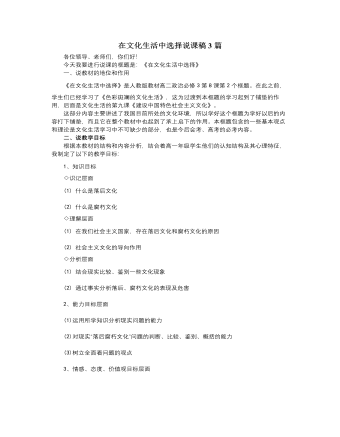
人教版高中政治必修3在文化生活中选择说课稿3篇
生2:每逢清明,或其他一些死者的纪念日,人们总要为死去的亲人烧纸钱。这幅漫画由烧纸钱演变为烧“家电”,说明随着社会环境的变化,人们根深蒂固的一些封建思想,还在影响着人们的生活。要花大力气去破除封建迷信活动。师:说到底,算命、烧纸钱是封建迷信活动,从文化角度来说,是落后文化。我们一起来看看在现实生活中,还有哪些落后文化在影响着人们的生活。生1:在一些边远落后地区,大人小孩生了病,不是看医生,而是让巫婆神汉来治,结果往往耽误了诊疗时间,有的甚至还丢掉了性命。生2:“重男轻女”“多子多福”,红白事大操大办现象在有些地方还很严重。师:这些落后文化都有哪些共同特征?在你看来,这些现象有哪些危害?生3:这些落后文化,在内容上带有迷信、愚昧、颓废、庸俗等色彩,在形式上常常以传统习俗的形式表现出来,如人们常见的看相、算命、测字、看风水等。它会麻痹人的意志,使人消极、悲观、绝望,对理想、前途、信念丧失信心;破坏社会的风气。
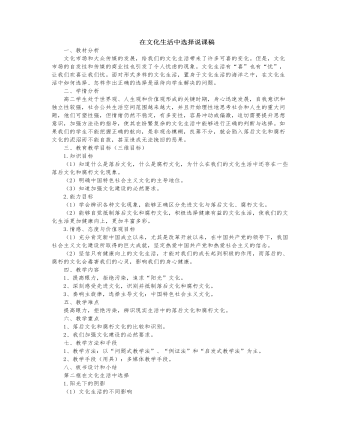
人教版高中政治必修3在文化生活中选择说课稿
一、教材分析文化市场和大众传媒的发展,给我们的文化生活带来了许多可喜的变化。但是,文化市场的自发性和传媒的商业性也引发了令人忧虑的现象。文化生活有“喜”也有“忧”,让我们欢喜让我们忧。面对形式多样的文化生活,置身于文化生活的海洋之中,在文化生活中如何选择、怎样作出正确的选择是亟待向学生解决的问题。二、学情分析高二学生处于世界观、人生观和价值观形成的关键时期,身心迅速发展,自我意识和独立性较强,社会公共生活空间范围越来越大,并且开始理性地思考社会和人生的重大问题,他们可塑性强,但情绪仍然不稳定,有多变性,容易冲动或偏激,迫切需要提升思想意识,加强方法论的指导,使其在纷繁复杂的文化生活中能够进行正确的判断与选择。如果我们的学生不能把握正确的航向,是非观念模糊,良莠不分,就会陷入落后文化和腐朽文化的泥沼而不能自拔,甚至造成无法挽回的恶果。
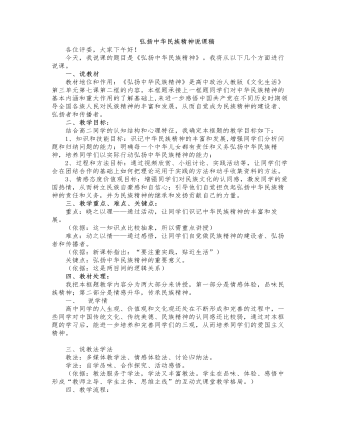
人教版高中政治必修3弘扬中华民族精神说课稿
3、评:以评促行。(6分钟)高中生的年龄特点决定了他们非常重视别人对自己的评价,渴望得到他人的肯定与鼓励。(所以我在班上组织一个活动:让同学们评选出班上“讲文明懂礼貌的文明之星”、“勤思考善创新的学习之星”(先让同学推举大家都认同的4位同学,然后对他们进行投票,投票结果将在下堂课上公布)以此活动来激发同学们用实际行动做民族精神的践行者和传播者。)4、唱:以情激行。(2分钟)在课程内容讲授结完毕后,组织全班同学跟着音乐高唱孙楠的《红旗飘飘》,生化情感,激发同学们的爱国情感。五、课堂拓展(请同学们各展才华:课后让同学们各自准备一个项目以体现民族精神。(项目形式是:或作文、书画;或剪纸、或歌曲小品)……让同学们用实际行动祝愿我们伟大的祖国更加繁荣昌盛!让我们的民族精神代代相传!)
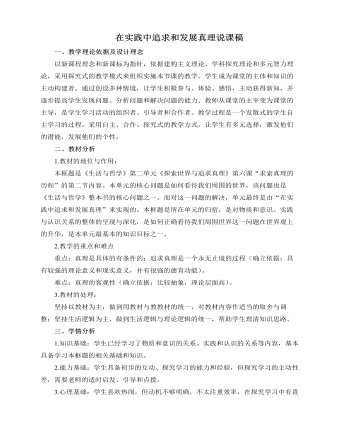
人教版高中政治必修4在实践中追求和发展真理说课稿(二)
一、教学理论依据及设计理念以新课程理念和新课标为指针,依据建构主义理论、学科探究理论和多元智力理论,采用探究式的教学模式来组织实施本节课的教学。学生成为课堂的主体和知识的主动构建者。通过创设多种情境,让学生积极参与、体验、感悟,主动获得新知,并逐步提高学生发现问题、分析问题和解决问题的能力。教师从课堂的主宰变为课堂的主导,是学生学习活动的组织者、引导者和合作者。教学过程是一个发散式的学生自主学习的过程。采用自主、合作、探究式的教学方式,让学生有多元选择,激发他们的潜能,发展他们的个性。二、教材分析1.教材的地位与作用:本框题是《生活与哲学》第二单元《探索世界与追求真理》第六课“求索真理的历程”的第二节内容。本单元的核心问题是如何看待我们周围的世界,该问题也是《生活与哲学》整本书的核心问题之一。

人教版高中语文必修1《黄河九曲:写事要有点波澜》说课稿
二、说学生本届高一学生经过了三年初中课改,在心理上,他们渴望表现的欲望和自主探究的欲望比较强烈,对有兴趣的知识表现出高度地热情,并具有一定的团结协作能力,但还是应该正视一个并不乐观的现实——在写作方面,学生知识还停留在简单的记叙及表达方式综合运用上,至于巧妙构思、谋篇布局很是空白。即便已经经过高中一个学期的学习,但还是有大部分学生依然基础较为薄弱,甚至出现不知从何下笔的现象。三、说教法与学法“老师搭台,学生唱戏”1、教法:本课将安排两课时(一课时学习一课时练笔),采用 PPT 多媒体课件教学,尝试用角色扮演法、图片展示法和多媒体教学等方法,教学中应该重视学生的参与性和探究性。2、学法:学生应该充分利用多角度创设的学习情境来激发自身学习的兴趣和热情,分组讨论,小组互助等形式让学生积极自主参与、进行问题探究学习。理论依据:建构主义理论“学生是学习的中心”的阐释,教师应该做学生主动建构意义的帮助者、促进者。
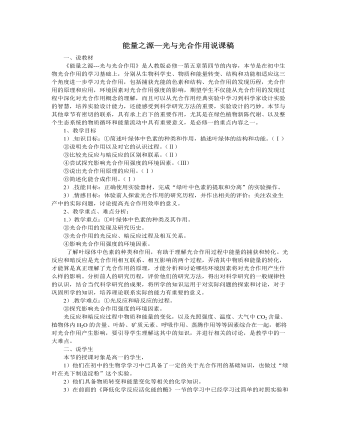
人教版高中生物必修1能量之源—光与光合作用说课稿
1)他们在初中的生物学学习中已具备了一定的关于光合作用的基础知识,也做过“绿叶在光下制造淀粉”这个实验。2)他们具备物质转变和能量变化等相关的化学知识。3)在前面的《降低化学反应活化能的酶》一节的学习中已经学习过简单的对照实验和相关的实验设计原则,使本节课最后的实验设计得以顺利进行。4)他们具有一定的 分析问题的能力,实施问题探究教学是可行的。三、教法和学法根据上述对教材和学生的分析,本节采用以下教法和学法:1)实验法:以实验说明结论。生物学的教学就是实验的教学过程,实验的展示形式有学生分组实验、老师示范实验、动画和图片演示实验等,让实验现象说明问题,而不是直接让学生记住结论。2)问题探究教学发:以问题引发兴趣。整个教学过程要设置好问题,层层展开,层层递进,让新知识与旧知识融为一个整体,让学生在步步上升中攀登到知识的顶峰。3)比较学习法,同时采用多媒体辅助教学,解决光合作用抽象的过程。
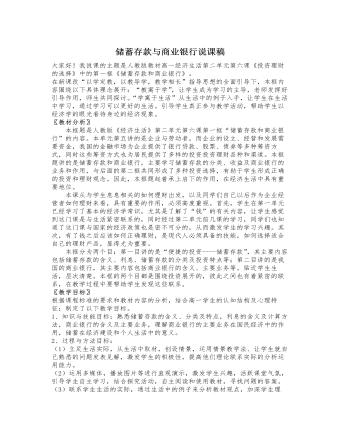
人教版高中政治必修1储蓄存款与商业银行说课稿
(一)储蓄存款1、储蓄存款的含义:讲解时让学生明白几个要点----谁在存?存什么?往哪存?有什么凭证?为什么存?并强调居民存款必须是合法拥有的,而且是有偿的。明确含义之后通过案例引导学生思考,人们都到哪些地方存款?学生活动:可以存入农业银行、建设银行、中国银行、工商银行信用合作社,邮政储蓄等;2、通过学生回答,我国的主要储蓄机构是各商业银行,并引导学生思考人们为什么将钱存入储蓄机构?储蓄的目的是什么?(可获得利息)从而引出3、利息含义及其计算公式,并熟悉利息计算公式4、提出问题:储蓄种类----定期,活期,让学生对比两种储蓄的异同并填表格。(二)我国的商业银行首先展示一组银行图标引导学生思考,哪些银行属于商业银行,从而引出第一个小问题----商业银行的含义。讲解定义,让学生抓住商业银行的业务和经营目标。
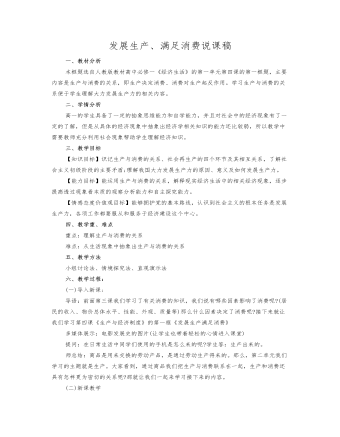
人教版高中政治必修1发展生产-满足消费说课稿
(2)多媒体展示:消费者们反映iPhone4的500万像素太不给力,3,5英寸的屏幕太小,促使苹果公司给新一代iPhone装上了一颗800万像素的摄像头4,0英寸的屏幕等,发展到最新的一代iPhone6plus已经达到5.5英寸。师:新一代iphone更新的驱动力是什么呢?其实新产品的升级对于苹果公司来说经费投入不小但是不经过升级换代产品就不能满足消费者的新的消费要求,所以消费者的反应客观上促进了iphone的升级换代——消费对生产的调整与升级起着导向作用(3)多媒体展示:随着网购迅猛的发展,快递、仓储业务等也出现爆发式增长。这一现象说明了什么?(举例:iPhone在全球市场的火热,“壳”文化产业第一个进入人们的视线,随着时间的发展,外壳的产业飞速蓬勃的发展着)结论:一个新的消费热点的出现往往能带动一个或多个产业的出现和成长。消费所形成的新的需求对生产的调整和升级起着导向作用,需求的数量和质量调节供给的数量和质量。

人教版高中地理必修1第二章第一节冷热不均引起大气运动说课稿
4、【自主探究】巴山夜雨的成因③材料三:三国时期,诸葛亮于农历6月的一天,在葫芦峪设下伏兵,打算用火攻全歼司马懿。这一天,晴空万里暑热难耐,真乃火攻之良机。诸葛亮依计将司马懿之众诱入谷中……然而,正当大火冲天,司马懿全军行将覆灭之时,一场大雨不期而至,大雨浇灭了诸葛亮扶汉反魏的壮志,使他喊出了“谋事在人,成事在天,不可强也”的千古悲歌。【设计理念】前后呼应,发散思维。通过自主探究,学生各抒己见,完成对热力环流整个知识框架的一个总结,既考查了学生的课堂学习效果,又锻炼了学生知识的迁移能力,并认识生活中的地理规律,用生动的语言拉近学生与大气理性知识的距离,体会到地理学科的重要性。【提问】如果将白天换成夏季,将夜间换成冬季,情况又会怎样?城市与郊区之间也存在着热力环流——城市风,它们是怎样形成的?了解城市风的出现有何重要意义?如果地球上在赤道和两极之间存在热力环流,这个热力环流应该怎样?这几个问题,请大家课后慢慢思考。
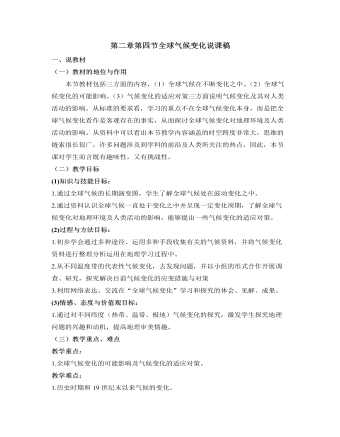
人教版高中地理必修1第二章第四节全球气候变化说课稿
(一)教材的地位与作用本节教材包括三方面的内容,(1)全球气候在不断变化之中。(2)全球气候变化的可能影响。(3)气候变化的适应对策三方面说明气候变化及其对人类活动的影响。从标准的要求看,学习的重点不在全球气候变化本身,而是把全球气候变化看作是客观存在的事实,从而探讨全球气候变化对地理环境及人类活动的影响。从资料中可以看出本节教学内容涵盖的时空跨度非常大,思维的链索很长很广,许多问题涉及到学科的前沿及人类所关注的热点,因此,本节课对学生而言既有趣味性,又有挑战性。 (二)教学目标(1)知识与技能目标:1.通过全球气候的长期演变图,学生了解全球气候处在波动变化之中。2.通过资料认识全球气候一直处于变化之中并呈现一定变化周期,了解全球气候变化对地理环境及人类活动的影响,能够提出一些气候变化的适应对策。